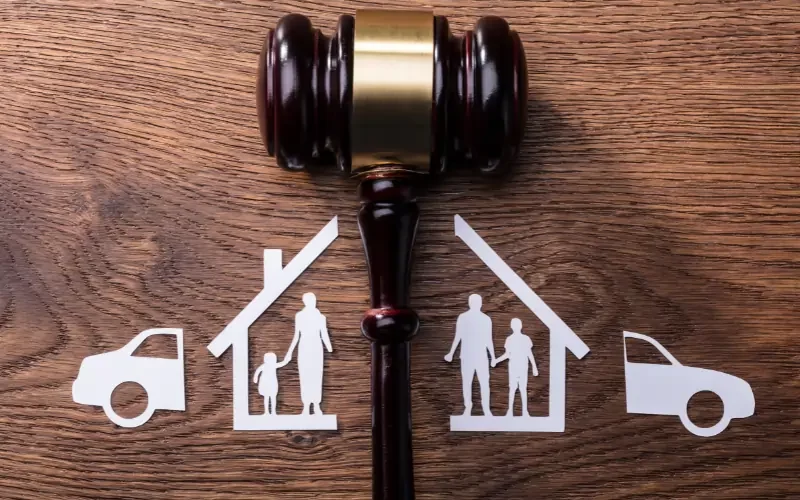
Going through a divorce? We get it – your world feels like it’s falling apart, and now you’re staring at your house wondering what happens next. You’re definitely not alone in feeling completely overwhelmed by all of this. The divorce process already has you crying into your coffee some mornings, and dealing with divorce and selling your home in New York just adds another heavy weight to your shoulders.
But here’s what we want you to know: your house doesn’t have to become another battlefield. You don’t need more stress right now – you need simple solutions that actually work. There are cash home buyers in Hudson Valley, NY, who’ve helped hundreds of people in your exact situation, and they get how hard this is. Let us walk you through your options in plain English, so you can make the choice that’s right for your personal circumstances and start moving toward a better tomorrow.
Can I Be Forced to Sell the House in a Divorce?
Unfortunately, yes – even if selling your house feels like the worst possible thing right now, a judge can force you to do it. We know that probably makes your stomach drop, but let us explain what actually happens so you’re not imagining the worst-case scenario.
Here’s the deal: if you and your soon-to-be ex-spouse can’t reach a mutual agreement about the house, the court steps in to decide for you. Maybe one of you wants to stay but can’t actually afford to buy out the other person’s share. Or maybe you both desperately need the money to start over, but can’t agree on how to make it happen.
The judge will try other solutions first, but sometimes a forced sale is the only way to move everyone forward. When this happens, it’s called a partition sale. Basically, the house gets sold, and the money gets divided according to New York law.
We know it sounds terrifying, but here’s something that might surprise you: most divorcing couples who go through this actually feel relieved afterward. It gives you both a clean break and real money to build your new life, instead of staying tied together financially through a house neither of you can really afford alone. Plus, it ends the legal battle quickly instead of dragging things out for months or years.
Options for the House During Divorce
So what can you actually do with your house? Let us break down your four main choices, and we promise to keep this simple:
- Just sell the thing. Honestly, this is what most divorcing couples end up doing, and for good reason. You both get cash in your pocket, nobody has to stress about mortgage payments anymore, and you can finally stop arguing about who’s responsible for fixing the leaky roof. You can work with a regular real estate agent if you want to try for top dollar, but that means months of showings and uncertainty. Or you can call a cash buyer and have this whole mess wrapped up in a couple of weeks.
- One person buys out the other. This only works if someone really wants to keep the house and can actually afford it on their own. The person staying has to get a brand new mortgage in just their name and come up with enough cash to pay their ex for half the house value. Sounds simple, but getting approved for a big loan on just one party’s income is way harder than when you were married.
- Keep owning it together. Some people try to co-own the house after divorce, usually because they want their kids to stay put or think it might be a good investment. But let us be real with you – staying financially tied to your ex through a house is complicated and stressful. Most people want a clean break, not more reasons to argue about money.
- One person walks away completely. Sometimes one spouse just can’t handle the payments and maintenance anymore and lets the other become the sole owner. This usually happens when there’s no equity anyway, or when someone’s financial situation is just too tight to keep up with everything.
How Property Is Divided in New York — Equitable Distribution Basics
Here’s something important to understand: New York is an equitable distribution state, which means the court tries to be fair, but that doesn’t always mean splitting everything 50/50 like some states do.
The judge looks at things like each party’s income, how long you were married, and what your financial situation looks like. Your marital home is usually considered marital property if you bought it while married, even if only one person’s name is on the paperwork.
Look, this stuff gets complicated fast, and that’s exactly why you need someone on your side who knows the law. Here’s the basic idea: if one of you owned the house before you got married, it usually stays separate property. But – and this is a big but – if you both contributed to mortgage payments or renovations after the wedding, suddenly that “separate” property might become shared marital property.
These assets acquired before marriage can turn into a real headache during divorce. Maybe your spouse owned the house first, but you spent five years helping pay the mortgage and remodeled the kitchen together. Now what? The court has to figure out what’s fair, and that’s where things get messy.
The bottom line is that marital assets get divided based on what the judge thinks is reasonable for your particular situation. It’s not always 50/50 – the court looks at how much each person makes, how long you were married, who’s taking care of the kids, and a bunch of other factors. That’s why it’s always in your best interest to talk to an experienced family law attorney who can explain how these rules apply to your specific circumstances.

Determining Home Value & Splitting Equity
Okay, so before anyone can split anything, you need to figure out what your house is actually worth and how much money you’d walk away with. Don’t worry – this isn’t as complicated as it sounds.
Your home’s equity is basically the money you’d get if you sold the house today and paid off what you still owe. So if your house is worth $300,000 and you owe $200,000 on the mortgage, you’ve got $100,000 in equity to split.
Valuation Methods: Appraisal, Comps, and Quick-Sale Pricing
You’ve got three ways to figure out what your house is worth, and each one gives you different information:
- Professional appraisal: This is like getting a report card for your house. An appraiser comes out, measures everything, checks out the condition, and compares your place to similar houses that sold recently. It’ll cost you a few hundred bucks, but courts really trust these numbers. Plus, having an official appraisal helps prevent any property dispute down the road about whether the value was fair.
- Free market analysis from a good agent: Any experienced real estate agent will do this for free, hoping you’ll hire them to sell your house. They’ll look at what similar houses in your neighborhood actually sold for (not just what people were asking) and give you a pretty accurate ballpark. A good agent will also share their agent’s advice about what’s happening in the current market – like whether it’s better to wait a few months or sell now.
- Quick-sale cash offer: This is what you’d get if you want to skip all the hassle and sell to a company that buys houses for cash. You’ll typically get a bit less than the full listing price, but you’ll know exactly what you’re getting, pay no realtor commissions, and you can be completely done in about two weeks. No waiting around for prospective buyers who might not even qualify for a loan. You also won’t have to worry about making home repairs before selling.
Right now, most houses in New York’s real estate market sit there for about two months before selling, and a lot of sellers end up dropping their price or making expensive repairs. If you just want this whole thing behind you, sometimes getting a little less money but having certainty and speed is totally worth it.
Selling During Divorce: Step-by-Step Fast Sale Workflow
If you decide selling is your best bet, here’s how the sale process usually works:
First, you and your spouse need to agree to sell, or you need a court order that says you have to. Then you’ll want to figure out what the house is worth and what condition it’s in. Getting on the same page about selling a house is crucial for moving forward.
If you go the traditional route with a real estate agent, you’ll need to agree on a listing agent and get the house ready for showings. That means cleaning, maybe making repairs, and having potential buyers walk through your home while you’re already dealing with divorce stress.
With a cash buyer, it’s way simpler. They’ll come look at your house as-is – no cleaning, no repairs, no staging. They’ll make you an offer within a few days, and if you say yes, you can close in a week or two without worrying about sitting on the real estate market or waiting for buyer financing.
During closing, your divorce attorney will work with the escrow company to make sure the money gets split correctly according to your divorce settlement. No surprises, no complications, and you won’t have to deal with high closing costs that eat into your proceeds.
Cash Buyer vs. Traditional Sale: Pros and Cons
Let me be honest about both options:
Selling with a real estate agent usually gets you the most money. But it also takes longer, costs more (agents typically charge 6% commission), and means dealing with showings, repairs, and potential buyers who might not even qualify for financing. Plus, you’re stuck maintaining and showing the house while you’re going through one of the most stressful times in your life. You also have to hope prospective buyers will actually follow through.
Selling to a cash buyer is faster and way less stressful. You get a firm offer quickly, close fast, and don’t have to worry about deals falling through. Yes, you might get a bit less money upfront, but when you factor in agent commissions, repairs, and the cost of carrying the house for months, your net proceeds might not be that different.
For people going through divorce, the emotional benefits of getting this major decision behind you quickly often outweigh getting every last dollar out of the home sale. Your financial future matters, but so does your peace of mind.

Handling Mortgage, Title, and Mortgage Assumption After Divorce
Here’s something that trips up a lot of people: even after your divorce is final, both of you are still responsible for the mortgage until it gets paid off. Just signing a piece of paper that gives the house to one person doesn’t remove the other person from the loan-based obligations.
When you sell the house, the mortgage gets paid off from the sale money, which solves this problem completely. If one of you wants to keep the house, that person needs to get a new loan in just their name and prove they can afford the mortgage payments on their single income.
The title company handling your sale will make sure all the paperwork is done right and that both of you sign everything needed according to your divorce decree. They’ll also make sure both parties have equal interest in the proceeds until the final split.
Court-Ordered Sales, Temporary Orders & Emergency Steps
Sometimes judges make temporary rules while your divorce is still going on. They might decide who gets to live in the house, who has to keep paying the mortgage payments, or whether you need permission before you can sell.
If the court actually orders you to sell, then both of you have to cooperate – even if one person really doesn’t want to. We know it feels awful to have a judge making decisions about your home, but your legal professional will walk you through exactly what you need to do and make sure you follow all the court’s rules.
Here’s when things get really urgent: if neither of you can afford the mortgage anymore and the bank is threatening foreclosure, you might be able to get emergency permission from the court to sell quickly. This is one of those times when selling preparation becomes absolutely critical – you don’t want to lose the house to the bank when you could have sold it and at least gotten some money out of it.
Nobody wants to be in this situation, but if you are, acting fast can save you from losing everything and completely wrecking your credit.
Tax and Financial Implications of Selling in a Divorce
Let’s talk about taxes for a minute – we know, nobody wants to think about this stuff when you’re already stressed, but it’s actually not as scary as it sounds.
Here’s the good news: when you sell your main home, you might not have to pay any taxes on the money you make. If you’re still married when you sell, you can avoid paying taxes on up to $500,000 in profit. If you’re already divorced or filing separately, that number drops to $250,000 per person – which is still pretty generous.
You’ll only have to worry about capital gains taxes if your profit is bigger than those amounts. Most people never hit these limits, but if you bought your house a really long time ago for way less than it’s worth now, you might need to plan for a tax bill.
There are other money things to think about, too. Property taxes need to be split fairly between both of you up to the closing date. And remember, once you don’t own a home anymore, you’ll lose some of the tax break benefits that come with homeownership.
Even if one of you has a bachelor’s degree in finance or thinks they know all about taxes, this is definitely a time to talk to a tax professional. They can help you figure out the best timing for your sale and maybe save you some money you didn’t even know you could save.

Working with Bob Will Buy It — Timeline, Documents & Next Steps
Bob Will Buy It is a trusted company based in Poughkeepsie that helps people in tough situations, including divorce. About our company- Bob Will Buy It: we get it. Divorce is hard enough without having to deal with a complicated home sale on top of everything else.
Here’s how our home-buying process works: You call us, and we’ll come take a look at your house. We buy houses in Orange County, NY, and all around the Hudson Valley area exactly as they are – no cleaning, no repairs, no hassle.
Within a day or two, we’ll give you a fair cash offer. If you say yes, we can usually close in about two weeks, but we’ll work with your timeline and coordinate with your divorce attorney to make sure everything lines up with your legal stuff.
You’ll need your deed, recent mortgage statements, property tax info, and any divorce paperwork that affects the sale. We handle most of the paperwork and work with the right legal professionals to make sure the sale money gets split correctly.
If you need to sell your house fast in Middletown, NY, or anywhere else we serve, we can give you the speed and certainty you need during this difficult time.
Conclusion
We know dealing with divorce and property feels overwhelming right now, but you have more control than you think. Whether a judge is making you sell, you’re trying to buy out your former spouse, or you just want to move on with your life, understanding your options helps you make the right choice.
Selling the marital home is often the cleanest solution. It gives both people money to start fresh and cuts all the financial ties between you. Yes, letting go of your family home is an emotional process, but it can also mean freedom and new possibilities.
The greatest asset most married couples have is their house, but it doesn’t have to be your biggest headache during divorce. With the right help, you can get this major part of your asset division handled and move forward with confidence.
If you’re ready to see what your options are or just want to know what your house is worth, contact us to get a cash offer with no strings attached. We’re here to help you get through this tough time and get the fair division you deserve.
